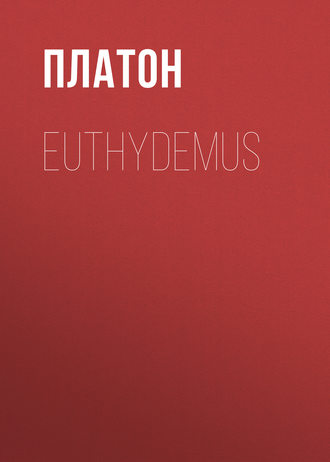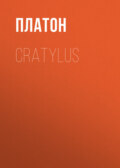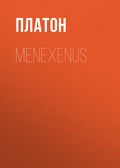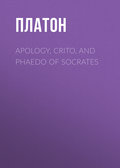
Платон
Euthydemus
Contradiction! said Dionysodorus; why, there never was such a thing.
Certainly there is, he replied; there can be no question of that. Do you, Dionysodorus, maintain that there is not?
You will never prove to me, he said, that you have heard any one contradicting any one else.
Indeed, said Ctesippus; then now you may hear me contradicting Dionysodorus.
Are you prepared to make that good?
Certainly, he said.
Well, have not all things words expressive of them?
Yes.
Of their existence or of their non-existence?
Of their existence.
Yes, Ctesippus, and we just now proved, as you may remember, that no man could affirm a negative; for no one could affirm that which is not.
And what does that signify? said Ctesippus; you and I may contradict all the same for that.
But can we contradict one another, said Dionysodorus, when both of us are describing the same thing? Then we must surely be speaking the same thing?
He assented.
Or when neither of us is speaking of the same thing? For then neither of us says a word about the thing at all?
He granted that proposition also.
But when I describe something and you describe another thing, or I say something and you say nothing – is there any contradiction? How can he who speaks contradict him who speaks not?
Here Ctesippus was silent; and I in my astonishment said: What do you mean, Dionysodorus? I have often heard, and have been amazed to hear, this thesis of yours, which is maintained and employed by the disciples of Protagoras, and others before them, and which to me appears to be quite wonderful, and suicidal as well as destructive, and I think that I am most likely to hear the truth about it from you. The dictum is that there is no such thing as falsehood; a man must either say what is true or say nothing. Is not that your position?
He assented.
But if he cannot speak falsely, may he not think falsely?
No, he cannot, he said.
Then there is no such thing as false opinion?
No, he said.
Then there is no such thing as ignorance, or men who are ignorant; for is not ignorance, if there be such a thing, a mistake of fact?
Certainly, he said.
And that is impossible?
Impossible, he replied.
Are you saying this as a paradox, Dionysodorus; or do you seriously maintain no man to be ignorant?
Refute me, he said.
But how can I refute you, if, as you say, to tell a falsehood is impossible?
Very true, said Euthydemus.
Neither did I tell you just now to refute me, said Dionysodorus; for how can I tell you to do that which is not?
O Euthydemus, I said, I have but a dull conception of these subtleties and excellent devices of wisdom; I am afraid that I hardly understand them, and you must forgive me therefore if I ask a very stupid question: if there be no falsehood or false opinion or ignorance, there can be no such thing as erroneous action, for a man cannot fail of acting as he is acting – that is what you mean?
Yes, he replied.
And now, I said, I will ask my stupid question: If there is no such thing as error in deed, word, or thought, then what, in the name of goodness, do you come hither to teach? And were you not just now saying that you could teach virtue best of all men, to any one who was willing to learn?
And are you such an old fool, Socrates, rejoined Dionysodorus, that you bring up now what I said at first – and if I had said anything last year, I suppose that you would bring that up too – but are non-plussed at the words which I have just uttered?
Why, I said, they are not easy to answer; for they are the words of wise men: and indeed I know not what to make of this word 'nonplussed,' which you used last: what do you mean by it, Dionysodorus? You must mean that I cannot refute your argument. Tell me if the words have any other sense.
No, he replied, they mean what you say. And now answer.
What, before you, Dionysodorus? I said.
Answer, said he.
And is that fair?
Yes, quite fair, he said.
Upon what principle? I said. I can only suppose that you are a very wise man who comes to us in the character of a great logician, and who knows when to answer and when not to answer – and now you will not open your mouth at all, because you know that you ought not.
You prate, he said, instead of answering. But if, my good sir, you admit that I am wise, answer as I tell you.
I suppose that I must obey, for you are master. Put the question.
Are the things which have sense alive or lifeless?
They are alive.
And do you know of any word which is alive?
I cannot say that I do.
Then why did you ask me what sense my words had?
Why, because I was stupid and made a mistake. And yet, perhaps, I was right after all in saying that words have a sense; – what do you say, wise man? If I was not in error, even you will not refute me, and all your wisdom will be non-plussed; but if I did fall into error, then again you are wrong in saying that there is no error, – and this remark was made by you not quite a year ago. I am inclined to think, however, Dionysodorus and Euthydemus, that this argument lies where it was and is not very likely to advance: even your skill in the subtleties of logic, which is really amazing, has not found out the way of throwing another and not falling yourself, now any more than of old.
Ctesippus said: Men of Chios, Thurii, or however and whatever you call yourselves, I wonder at you, for you seem to have no objection to talking nonsense.
Fearing that there would be high words, I again endeavoured to soothe Ctesippus, and said to him: To you, Ctesippus, I must repeat what I said before to Cleinias – that you do not understand the ways of these philosophers from abroad. They are not serious, but, like the Egyptian wizard, Proteus, they take different forms and deceive us by their enchantments: and let us, like Menelaus, refuse to let them go until they show themselves to us in earnest. When they begin to be in earnest their full beauty will appear: let us then beg and entreat and beseech them to shine forth. And I think that I had better once more exhibit the form in which I pray to behold them; it might be a guide to them. I will go on therefore where I left off, as well as I can, in the hope that I may touch their hearts and move them to pity, and that when they see me deeply serious and interested, they also may be serious. You, Cleinias, I said, shall remind me at what point we left off. Did we not agree that philosophy should be studied? and was not that our conclusion?
Yes, he replied.
And philosophy is the acquisition of knowledge?
Yes, he said.
And what knowledge ought we to acquire? May we not answer with absolute truth – A knowledge which will do us good?
Certainly, he said.
And should we be any the better if we went about having a knowledge of the places where most gold was hidden in the earth?
Perhaps we should, he said.
But have we not already proved, I said, that we should be none the better off, even if without trouble and digging all the gold which there is in the earth were ours? And if we knew how to convert stones into gold, the knowledge would be of no value to us, unless we also knew how to use the gold? Do you not remember? I said.
I quite remember, he said.
Nor would any other knowledge, whether of money-making, or of medicine, or of any other art which knows only how to make a thing, and not to use it when made, be of any good to us. Am I not right?
He agreed.
And if there were a knowledge which was able to make men immortal, without giving them the knowledge of the way to use the immortality, neither would there be any use in that, if we may argue from the analogy of the previous instances?
To all this he agreed.
Then, my dear boy, I said, the knowledge which we want is one that uses as well as makes?
True, he said.
And our desire is not to be skilful lyre-makers, or artists of that sort – far otherwise; for with them the art which makes is one, and the art which uses is another. Although they have to do with the same, they are divided: for the art which makes and the art which plays on the lyre differ widely from one another. Am I not right?
He agreed.
And clearly we do not want the art of the flute-maker; this is only another of the same sort?
He assented.
But suppose, I said, that we were to learn the art of making speeches – would that be the art which would make us happy?
I should say, no, rejoined Cleinias.
And why should you say so? I asked.
I see, he replied, that there are some composers of speeches who do not know how to use the speeches which they make, just as the makers of lyres do not know how to use the lyres; and also some who are of themselves unable to compose speeches, but are able to use the speeches which the others make for them; and this proves that the art of making speeches is not the same as the art of using them.
Yes, I said; and I take your words to be a sufficient proof that the art of making speeches is not one which will make a man happy. And yet I did think that the art which we have so long been seeking might be discovered in that direction; for the composers of speeches, whenever I meet them, always appear to me to be very extraordinary men, Cleinias, and their art is lofty and divine, and no wonder. For their art is a part of the great art of enchantment, and hardly, if at all, inferior to it: and whereas the art of the enchanter is a mode of charming snakes and spiders and scorpions, and other monsters and pests, this art of their's acts upon dicasts and ecclesiasts and bodies of men, for the charming and pacifying of them. Do you agree with me?
Yes, he said, I think that you are quite right.
Whither then shall we go, I said, and to what art shall we have recourse?
I do not see my way, he said.
But I think that I do, I replied.
And what is your notion? asked Cleinias.
I think that the art of the general is above all others the one of which the possession is most likely to make a man happy.
I do not think so, he said.
Why not? I said.
The art of the general is surely an art of hunting mankind.
What of that? I said.
Why, he said, no art of hunting extends beyond hunting and capturing; and when the prey is taken the huntsman or fisherman cannot use it; but they hand it over to the cook, and the geometricians and astronomers and calculators (who all belong to the hunting class, for they do not make their diagrams, but only find out that which was previously contained in them) – they, I say, not being able to use but only to catch their prey, hand over their inventions to the dialectician to be applied by him, if they have any sense in them.
Good, I said, fairest and wisest Cleinias. And is this true?
Certainly, he said; just as a general when he takes a city or a camp hands over his new acquisition to the statesman, for he does not know how to use them himself; or as the quail-taker transfers the quails to the keeper of them. If we are looking for the art which is to make us blessed, and which is able to use that which it makes or takes, the art of the general is not the one, and some other must be found.
CRITO: And do you mean, Socrates, that the youngster said all this?
SOCRATES: Are you incredulous, Crito?
CRITO: Indeed, I am; for if he did say so, then in my opinion he needs neither Euthydemus nor any one else to be his instructor.
SOCRATES: Perhaps I may have forgotten, and Ctesippus was the real answerer.
CRITO: Ctesippus! nonsense.
SOCRATES: All I know is that I heard these words, and that they were not spoken either by Euthydemus or Dionysodorus. I dare say, my good Crito, that they may have been spoken by some superior person: that I heard them I am certain.
CRITO: Yes, indeed, Socrates, by some one a good deal superior, as I should be disposed to think. But did you carry the search any further, and did you find the art which you were seeking?
SOCRATES: Find! my dear sir, no indeed. And we cut a poor figure; we were like children after larks, always on the point of catching the art, which was always getting away from us. But why should I repeat the whole story? At last we came to the kingly art, and enquired whether that gave and caused happiness, and then we got into a labyrinth, and when we thought we were at the end, came out again at the beginning, having still to seek as much as ever.
CRITO: How did that happen, Socrates?
SOCRATES: I will tell you; the kingly art was identified by us with the political.
CRITO: Well, and what came of that?
SOCRATES: To this royal or political art all the arts, including the art of the general, seemed to render up the supremacy, that being the only one which knew how to use what they produce. Here obviously was the very art which we were seeking – the art which is the source of good government, and which may be described, in the language of Aeschylus, as alone sitting at the helm of the vessel of state, piloting and governing all things, and utilizing them.
CRITO: And were you not right, Socrates?
SOCRATES: You shall judge, Crito, if you are willing to hear what followed; for we resumed the enquiry, and a question of this sort was asked: Does the kingly art, having this supreme authority, do anything for us? To be sure, was the answer. And would not you, Crito, say the same?
CRITO: Yes, I should.
SOCRATES: And what would you say that the kingly art does? If medicine were supposed to have supreme authority over the subordinate arts, and I were to ask you a similar question about that, you would say – it produces health?
CRITO: I should.
SOCRATES: And what of your own art of husbandry, supposing that to have supreme authority over the subject arts – what does that do? Does it not supply us with the fruits of the earth?
CRITO: Yes.
SOCRATES: And what does the kingly art do when invested with supreme power? Perhaps you may not be ready with an answer?
CRITO: Indeed I am not, Socrates.
SOCRATES: No more were we, Crito. But at any rate you know that if this is the art which we were seeking, it ought to be useful.
CRITO: Certainly.
SOCRATES: And surely it ought to do us some good?
CRITO: Certainly, Socrates.
SOCRATES: And Cleinias and I had arrived at the conclusion that knowledge of some kind is the only good.
CRITO: Yes, that was what you were saying.
SOCRATES: All the other results of politics, and they are many, as for example, wealth, freedom, tranquillity, were neither good nor evil in themselves; but the political science ought to make us wise, and impart knowledge to us, if that is the science which is likely to do us good, and make us happy.
CRITO: Yes; that was the conclusion at which you had arrived, according to your report of the conversation.
SOCRATES: And does the kingly art make men wise and good?
CRITO: Why not, Socrates?
SOCRATES: What, all men, and in every respect? and teach them all the arts, – carpentering, and cobbling, and the rest of them?
CRITO: I think not, Socrates.
SOCRATES: But then what is this knowledge, and what are we to do with it? For it is not the source of any works which are neither good nor evil, and gives no knowledge, but the knowledge of itself; what then can it be, and what are we to do with it? Shall we say, Crito, that it is the knowledge by which we are to make other men good?
CRITO: By all means.
SOCRATES: And in what will they be good and useful? Shall we repeat that they will make others good, and that these others will make others again, without ever determining in what they are to be good; for we have put aside the results of politics, as they are called. This is the old, old song over again; and we are just as far as ever, if not farther, from the knowledge of the art or science of happiness.
CRITO: Indeed, Socrates, you do appear to have got into a great perplexity.
SOCRATES: Thereupon, Crito, seeing that I was on the point of shipwreck, I lifted up my voice, and earnestly entreated and called upon the strangers to save me and the youth from the whirlpool of the argument; they were our Castor and Pollux, I said, and they should be serious, and show us in sober earnest what that knowledge was which would enable us to pass the rest of our lives in happiness.
CRITO: And did Euthydemus show you this knowledge?
SOCRATES: Yes, indeed; he proceeded in a lofty strain to the following effect: Would you rather, Socrates, said he, that I should show you this knowledge about which you have been doubting, or shall I prove that you already have it?
What, I said, are you blessed with such a power as this?
Indeed I am.
Then I would much rather that you should prove me to have such a knowledge; at my time of life that will be more agreeable than having to learn.
Then tell me, he said, do you know anything?
Yes, I said, I know many things, but not anything of much importance.
That will do, he said: And would you admit that anything is what it is, and at the same time is not what it is?
Certainly not.
And did you not say that you knew something?
I did.
If you know, you are knowing.
Certainly, of the knowledge which I have.
That makes no difference; – and must you not, if you are knowing, know all things?
Certainly not, I said, for there are many other things which I do not know.
And if you do not know, you are not knowing.
Yes, friend, of that which I do not know.
Still you are not knowing, and you said just now that you were knowing; and therefore you are and are not at the same time, and in reference to the same things.
A pretty clatter, as men say, Euthydemus, this of yours! and will you explain how I possess that knowledge for which we were seeking? Do you mean to say that the same thing cannot be and also not be; and therefore, since I know one thing, that I know all, for I cannot be knowing and not knowing at the same time, and if I know all things, then I must have the knowledge for which we are seeking – May I assume this to be your ingenious notion?
Out of your own mouth, Socrates, you are convicted, he said.
Well, but, Euthydemus, I said, has that never happened to you? for if I am only in the same case with you and our beloved Dionysodorus, I cannot complain. Tell me, then, you two, do you not know some things, and not know others?
Certainly not, Socrates, said Dionysodorus.
What do you mean, I said; do you know nothing?
Nay, he replied, we do know something.
Then, I said, you know all things, if you know anything?
Yes, all things, he said; and that is as true of you as of us.
O, indeed, I said, what a wonderful thing, and what a great blessing! And do all other men know all things or nothing?
Certainly, he replied; they cannot know some things, and not know others, and be at the same time knowing and not knowing.
Then what is the inference? I said.
They all know all things, he replied, if they know one thing.
O heavens, Dionysodorus, I said, I see now that you are in earnest; hardly have I got you to that point. And do you really and truly know all things, including carpentering and leather-cutting?
Certainly, he said.
And do you know stitching?
Yes, by the gods, we do, and cobbling, too.
And do you know things such as the numbers of the stars and of the sand?
Certainly; did you think we should say No to that?
By Zeus, said Ctesippus, interrupting, I only wish that you would give me some proof which would enable me to know whether you speak truly.
What proof shall I give you? he said.
Will you tell me how many teeth Euthydemus has? and Euthydemus shall tell how many teeth you have.
Will you not take our word that we know all things?
Certainly not, said Ctesippus: you must further tell us this one thing, and then we shall know that you are speak the truth; if you tell us the number, and we count them, and you are found to be right, we will believe the rest. They fancied that Ctesippus was making game of them, and they refused, and they would only say in answer to each of his questions, that they knew all things. For at last Ctesippus began to throw off all restraint; no question in fact was too bad for him; he would ask them if they knew the foulest things, and they, like wild boars, came rushing on his blows, and fearlessly replied that they did. At last, Crito, I too was carried away by my incredulity, and asked Euthydemus whether Dionysodorus could dance.
Certainly, he replied.
And can he vault among swords, and turn upon a wheel, at his age? has he got to such a height of skill as that?
He can do anything, he said.
And did you always know this?
Always, he said.
When you were children, and at your birth?
They both said that they did.
This we could not believe. And Euthydemus said: You are incredulous, Socrates.
Yes, I said, and I might well be incredulous, if I did not know you to be wise men.
But if you will answer, he said, I will make you confess to similar marvels.





